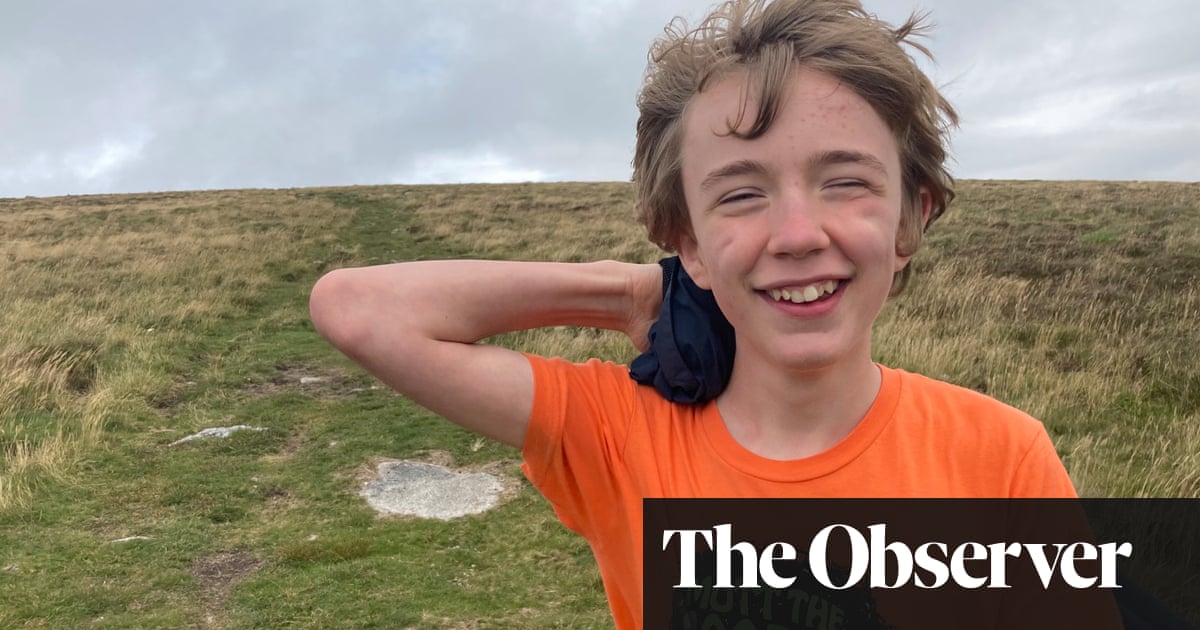Halfway through Maybe I’m Amazed, there’s a photograph of John Harris’s son, James, with one of his heroes. James is a young-looking 10 in knee-length shorts decorated with stars. Ian Hunter of 1970s rock band Mott the Hoople stands beside him, a hand gently around his shoulder. “Sixty-nine years separate them,” Harris writes. “Here is proof of how songs and their creators find fans in the most unlikely of places.”
Maybe I’m Amazed is the story of a growing child’s love of music, but it’s more than that: it’s also about how songs provided a whole world for James, and his family, after his autism diagnosis. It marks a departure for Harris, whose previous journalism, aside from his political work for the Guardian, has involved editing magazines and writing columns, reviews and other books about music.
Books exploring personal connections to music have boomed in recent years (I’m primed to notice, having written a music memoir myself, The Sound of Being Human, in 2022). Like mine and many others, Harris’s is structured around a playlist, but this skeleton (of James’s favourite songs) only provides a loose frame. The book is more of an outlet for a father navigating an unexpected relationship with his child, in which music brings a welcome means of communication, cohesion and comfort.
Harris writes movingly about his son’s early years, in which music was ever-present, partly because of his parents’ enthusiasms (Harris points out that his first gig was Level 42 aged 13, while James’s was Chuck Berry at Camp Bestival just before he was two; Harris’s wife, Ginny, also works in the music business). Harris notices how intensely James responds to songs from this age, loving his dad playing cyclical chord sequences on his guitar, hammering rhythms along to them in perfect time on his tiny toy piano. Elsewhere, he is often quiet and withdrawn, and repeats streams of words, a common characteristic of autism, known as echolalia.
James’s diagnosis comes before he turns three. You feel for Harris as he theorises why certain music moves his son, as he can’t do it himself: “In a lot of the Beatles’s early music, there is an irresistible optimism, everything seemingly going at 100 miles an hour, thanks to an energy that the music could barely contain.” His early chapters read like a cathartic outpouring about the hurdles and obstacles his family has had to face, but his forays into neuroscience get deeper by the page, which is where this book’s real power lies.
Harris is brave enough to consider the issues of neurodiversity and the music-loving brain in accessible ways. After noting Mozart’s many early prodigious achievements, he writes: “Whether any of this allows anyone to definitely say he was autistic is a question that probably answers itself … [but] “his talent clearly came with a sharp sense of difference and his brief life was lived outside all kinds of norms and conventions”.
In other examples of behaviours that it’s possible to see on the autism spectrum – although Harris is at pains to not impose labels on anyone –we’re told how Mariah Carey and Elton John played piano pieces by ear aged three, and a line from Nick Drake’s Hazey Jane II speaks volumes about that artist’s own struggles (“If songs were lines in a conversation/ The situation would be fine”). Harris also recalls how his father-in-law, a BBC recording engineer, once sat in on a Beatles interview. His main memory was of John Lennon sitting in a corner, ordering a Rolls-Royce from a car dealer, painstakingly listing his precise specifications.
A 2011 Guardian profile of psychiatrist Lorna Wing, who defined the idea of the autism spectrum, is also quoted; she believed autistic traits were required “for real success” in the arts. This idea lingers in passages about inherited traits between generations, and Harris recognises his own obsessions in his son’s genetic makeup. This also introduces some funny moments, when he looks back at his own younger years: “When I was 13, a kid at school wrote an elegantly mocking poem about our class, which contained the line ‘Harris brings in another tape’.”
There are arresting moments throughout too. We’re reminded of how music cuts through the chaotic, noisy distractions of everyday life for those with autism spectrum disorder, and Harris recounts the tragic death in an NHS care unit of Connor Sparrowhawk, an autistic 18-year-old obsessed with David Bowie and the Beatles, as he wonders what support there will be for his child, who will soon be an adult.
“Autistic people are part of a neurological family that includes millions of other human beings,” he reminds us. His book also underlines for us how music, in so many magical ways, can powerfully bring very different people together.
